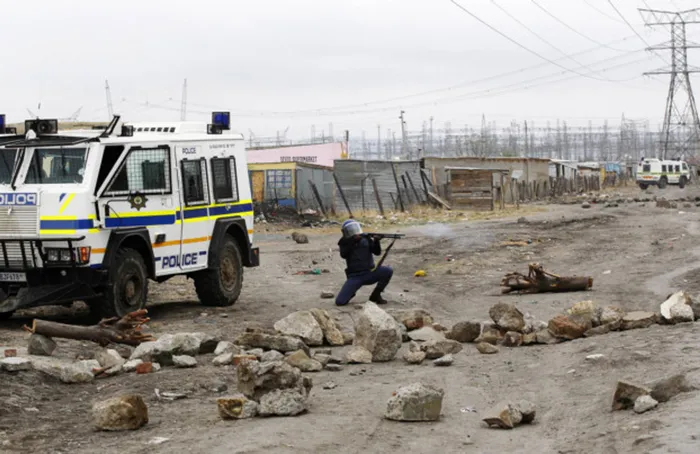Marikana inquiry: fury at vetting of journos

File photo: A police officer fires to disperse miners at Lonmin's Marikana mine. File photo: A police officer fires to disperse miners at Lonmin's Marikana mine.
Johannesburg - The Farlam Commission of Inquiry into the Marikana killings begins work on Monday amid furious objections to its stipulation that journalists covering it must be vetted by the Department of State Security.
The commission said on Friday that only accredited media members, vetted by the department, would be allowed to attend its hearings.
Journalists needed to show “their accreditation cards to the security personnel”.
It said this accreditation could be revoked at any time by the department or commission secretary following a hearing with the affected party, in terms of the commission’s rules of procedure, released at the weekend.
Nic Dawes, deputy chairman of the SA National Editors’ Forum and chairman of its media freedom committee, said the rule was “completely inappropriate”.
“We hope they will come to their senses,” he said on Sunday.
The only way the majority of South Africans could be given an accurate account of the commission’s work was if journalists were able to report freely on proceedings, said Dawes.
“It shouldn’t be up to the Department of State Security to determine who is allowed in,” he said.
Committee member Raymond Louw said the conditions imposed on the media were “unacceptable” and would be taken up with the commission.
Patrick Conroy, head of television news channel eNCA, said the broadcaster had written to the commission and the Department of Justice to seek clarity and express its concerns.
“We hope to resolve the matter this week,” he said.
Although the work of the commission has been scheduled to begin in Rustenburg on Monday with a brief ceremony acknowledging the families of those who lost their lives, the hearings are expected to get under way only on Wednesday.
Commission spokesman Kevin Malunga said the ceremony would be followed by an inspection of Lonmin’s Marikana mine to establish the conditions under which miners worked.
The commission was appointed by President Jacob Zuma after the killings at the mine, where 34 striking mineworkers died when police opened fire on August 16 and 11 others, including members of the police, security guards and union officials, died in other incidents.
Malunga said representatives of Lonmin, the SAPS, the National Union of Mineworkers and its rival, the Association of Mineworkers and Construction Union, would begin presenting an overview of events from their perspectives.
The hearings are to be held at Rustenburg’s Civic Centre. The commission has a four-month deadline to conclude its work.
Malunga said the evidence led would include post-mortem reports and video footage that included scenes of police firing at mineworkers.
The commission wants the SAPS’s presentation to include notes, photographs and “plans with annotations”.
Representatives of the Madibeng and Rustenburg municipalities may, where necessary, be required to point out to the commission places in informal or formal settlements under their jurisdiction.
The commission’s schedule is to be confirmed by its chairman, retired Supreme Court of Appeal Judge Ian Farlam.
Proceedings of the inquiry will be open to the public except when Judge Farlam rules they be held in camera “in the interest of justice”.
The next of kin of those killed are to be given preference in the allocation of seats. Malunga said arrangements would be made for viewing facilities next to the auditorium and the Marikana Community Hall, “where possible and practical”.
Political Bureau